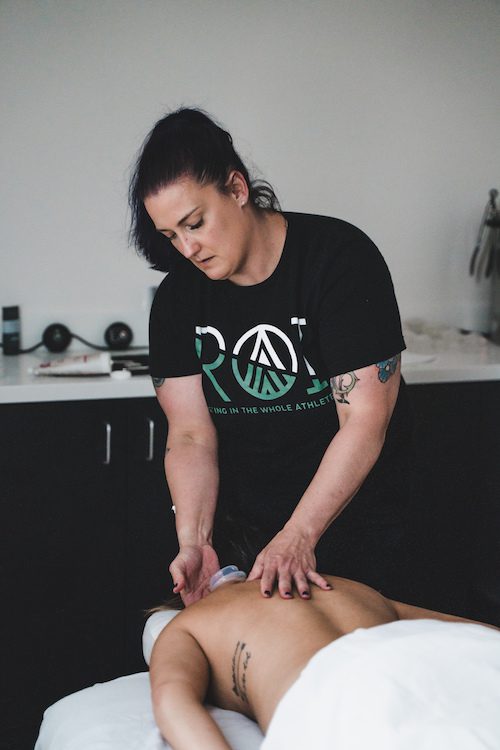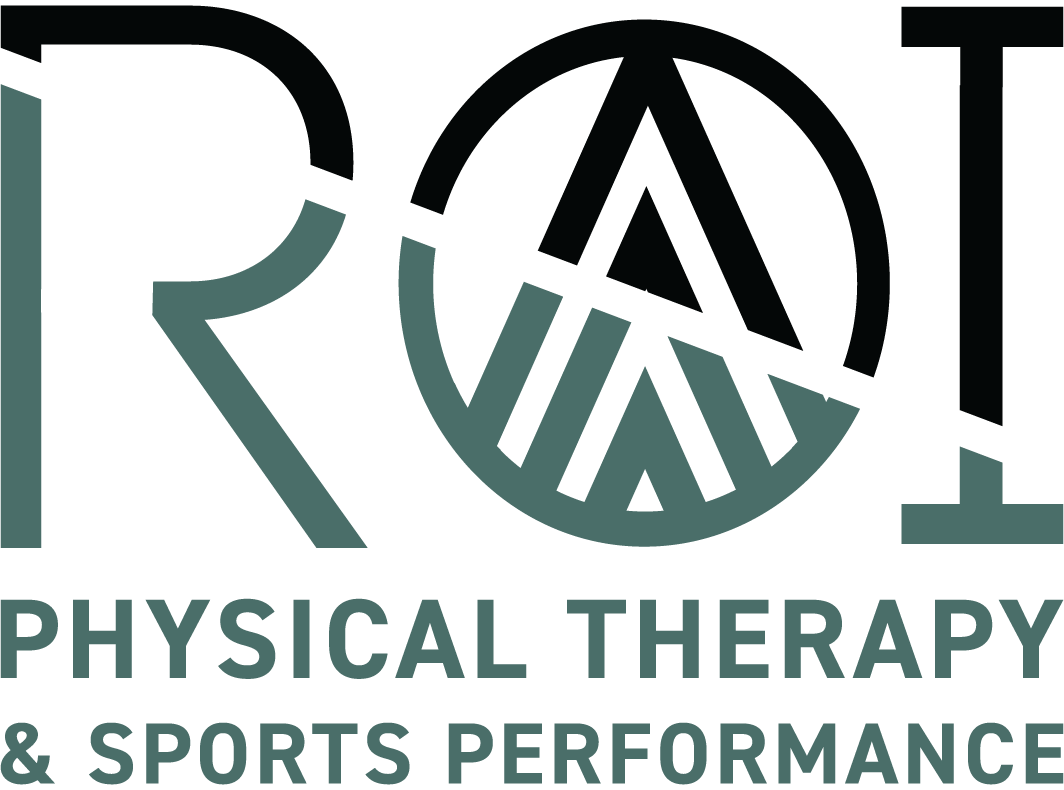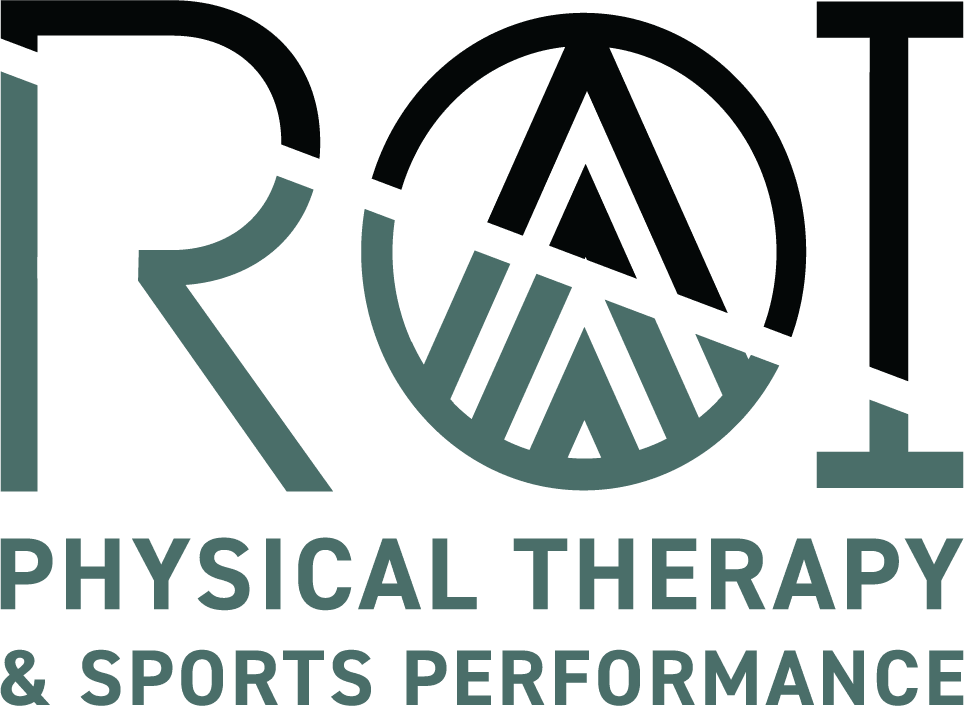Massage
 Massage therapy in sports medicine can be described as a collection of massage techniques performed on athletes or active individuals for the purpose of aiding recovery or treating pathology. It is often utilized to aid an athlete’s recovery from intense exercise or as a treatment option when performing clinical rehabilitation. Team ROI’s massage therapy treatment sessions are not a stand-alone therapy and integrate well with Team ROI’s holistic approach to sports recovery and therapy.
Massage therapy in sports medicine can be described as a collection of massage techniques performed on athletes or active individuals for the purpose of aiding recovery or treating pathology. It is often utilized to aid an athlete’s recovery from intense exercise or as a treatment option when performing clinical rehabilitation. Team ROI’s massage therapy treatment sessions are not a stand-alone therapy and integrate well with Team ROI’s holistic approach to sports recovery and therapy.
How Does Massage Therapy Promote Recovery?
Massage therapy is a tool that benefits elite athletes by enhancing athletic performance in preparation for competitions. Additionally, it can be used as a post-competition or post-exercise treatment therapy wherein activities that have been strenuous on the body were performed. Massage therapy is part of a manual intervention program used to treat sports-related musculoskeletal injuries.
For athletes, the frequency of massage is determined as needed based on involvement in a specific sport and your specific goals. Some athletes receive massages daily while others will do it before a certain event. Awareness of your training schedule and what your massage therapist recommends for your specific sport, training, and goals all factor into designing an integrated massage therapy program. With massage therapy incorporated into your recovery program, athletes should expect to see improved flexibility, blood circulation, reduced pain, improved sleep, and relaxation.
What Kinds of Massage Therapy Does Team ROI Offer?
Three forms of massage techniques are frequently employed in a recovery capacity. These include effleurage, petrissage, and deep transverse friction massage. Which type of massage technique is best for promoting your recovery?
- Effleurage. This massage technique incorporates strokes that are performed slowly, utilizing light or gentle pressure. It is used to increase blood circulation, stimulate lymphatic drainage and promote relaxation. The benefits of effleurage massage are improved recovery, increased healing, and relaxation. With increased blood circulation, oxygen and nutrients in the blood are better able to help repair damaged tissues. Furthermore, lactic acid, to which muscle stiffness can be attributed, can be removed using effleurage and result in a quicker healing process and faster recovery. Lastly, effleurage massage stimulates the parasympathetic system, which is responsible for returning the body back to a relaxed and calm state after emotions such as stress. This results in corporeal relaxation and a lower heart rate.
- Petrissage. The petrissage massage technique includes kneading, wringing, and scooping strokes. It is performed with deeper pressure depending on the patient’s tolerance. This massage technique works to free up tissue and muscle movement by treating muscle knots or spasms. The petrissage technique promotes blood circulation, breaks up adhesions, and relaxes the muscles. Petissage achieves these effects by lifting tissues away from structures to relieve tension, stretching, and loosening muscle fibers. Breaking down adhesions, or areas of thick connective tissue which develop after a muscular injury or surgery is another benefit of petrissage in that it provides pain relief. If left untreated, adhesions can compress nerves and restrict movement causing pain. Finally, petrissage increases the range of movement by stretching muscle fibers. During this process the muscle fibers are able to move apart slightly, releasing tightness and improving flexibility.
- Deep Friction Massage. The purpose of deep friction massage is to maintain mobility within the soft tissue structures of ligament, tendon, and muscle and prevent adherent scars from forming. This massage uses deep pressure and sweeps applied transversely to target specifically involved tissues, enhancing circulation and the return of fluids. Your massage therapist will differentiate between contractile structures and non-contractile structures to determine the proper application of massage techniques in an affected area. In addition, the severity of pain will be clinically assessed to determine appropriate deep friction massage intervals based on the individual athlete’s needs. When applied correctly, this massage technique is effective in providing athletes with pain relief, regeneration of connective tissues through stimulation, prevention of adhesion formation, and increased blood flow resulting in the removal of chemical irritants.
Our clinicians are adept in assessing which massage technique best aligns with our clients’ recovery needs of an affected area in relation to the physical exertion performed. Each of these massage therapy techniques provides a crucial role as part of a holistically integrated approach to sports medicine and physical therapy. Massage therapy not only provides relief from pain or injury but is a vital part of an athlete’s recovery process that promotes an athlete’s total progress.
WHO PERFORMS MASSAGE THERAPY?
Massage therapy requires a professional trained in advanced therapeutic techniques that are complementary in an all-encompassing recovery and healing program. Our licensed massage therapist (LMT) is certified in:
- Instrument-Assisted Soft Tissue Mobilization (IASTM)
- Cupping
- Orthopedic Massage
- Deep Tissue Massage
- Sports Massage
Our staff of physiotherapists provide clients with a comprehensive recovery management program. They provide clients with expert feedback on the efficacy and efficiency of their recovery plan while monitoring and tracking their progress. With our well-trained physiotherapy professionals, you can rest assured of a fast and optimal recovery process.
How can Team ROI Help?
Team ROI’s customized plans are designed for our patients to ensure a speedy, progressive recovery process that focuses on the whole athlete. Massage therapy when incorporated with a holistic wellness program is an effective treatment offered as part of our manual recovery services.
Massage therapy treatments work to reduce the risk of athletic injuries as well as to promote maintenance and function of the musculoskeletal system. Each session is catered to each athlete’s needs with price points starting at: $50 for a 30-minute session; $80 for a 60-minute session; and $120 for a 90-minute session. Other complementary therapy treatments integrate well to help clients reach peak performance as part of a comprehension approach to fitness focused on the overall well-being of each individual athlete.
Contact us by phone at (512) 955-5337 or send us a message to find out how massage therapy can be holistically integrated as part of your total wellness recovery.

